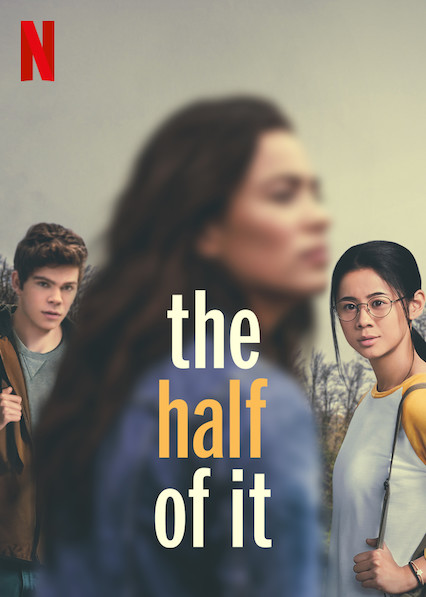By Vivian Nguyen
Northwest Asian Weekly

![]()
![]()
![]()
![]()
One of the first things you hear from Ellie Chu, the protagonist of Netflix’s latest teen rom-com “The Half of It,” is: “This is not a love story.”
It feels trite to preface a teen movie like this. Isn’t this what all coming-of-age films strive to be? And don’t teens often say this to assert their identity? “I’m different—I’m not like the other teens.” Or in this case, I’m not like the other teen stories.
Well, this movie, truthfully, is not like the others.
“The Half of It,” which stars actors Leah Lewis, Daniel Diemer, and Alexxis Lemire, follows a shy yet bright Chinese American high schooler named Ellie (Lewis) who befriends Paul (Diemer), an inarticulate but sweet, white jock. Directed by Alice Wu, who’s best known for the beloved queer romance film “Saving Face,” “The Half of It” brings a familiar charm that echoes Wu’s first film and directorial debut.
Paul enlists Ellie to secretly write eloquent love letters to his crush, Aster (Lemire)—someone who Ellie also happens to have a secret crush on. It’s like “Cyrano de Bergerac,” but set in a modern-day high-school setting, with a gender swap, and with a sprinkle of Mandarin.
Initially, Ellie refuses to write letters on Paul’s behalf. But, after learning that her widowed father is behind on household bills, Ellie agrees to Paul’s request to earn some cash. Expressing heartfelt sentiments to Aster in letters and text messages comes easily to Ellie. The two talk about their shared interests over art, culture, and literature—all with Aster believing she’s talking to Paul.
Paul and Aster finally go on their first date. It doesn’t go well. Paul struggles to talk with Aster in-person without Ellie’s knowledge and assistance. Ellie assumes that’s the end of it, but Paul talks her into teaching him about art and literature, so he can hold more organic conversations with Aster in the future. Paul and Ellie become closer friends during this time, and slowly open up about their respective family backgrounds set against a fictional small town in Washington state.
When Paul and Aster make it to their second date, the two still struggle to find common ground to chat about until Ellie (from a distance) starts texting Aster as Paul. Aster reacts positively to the text messages from “Paul” and, seizing the moment, the real Paul decides to confess his love to Aster on the spot and later kisses her.
One day, Aster invites Ellie to hang out, and they go on a day trip to a nearby hot springs. Paired with some stunning cinematography, we see Aster and Ellie float on their backs as they share some of the most intimate conversations in the entire film and chat about things like identity, faith, and loneliness. It’s one of the quieter yet sweetest moments in the film, and shows how much natural chemistry the two share.
Things get complicated as they always do in teen rom-coms. Paul grows to believe that Ellie has feelings for him and, having developed feelings for her, he kisses her. As Ellie recoils from the kiss, Aster naturally walks in on them (because, again, teen rom-com). When Aster storms off and Ellie calls out in protest, Paul finally connects the dots: Ellie’s in love with Aster. And because these characters live in an especially small, religious town, Paul spits out to Ellie, “It’s a sin.” And he, too, walks out on her.
Everything finally comes to a head at a church service where it’s revealed that Ellie was the one writing Aster the letters, and not Paul. Aster feels hurt and betrayed by both parties. Paul gets slapped in the face. And no one truly understands Ellie’s real intentions for why she wrote those letters to Aster.
One of the strongest points about this movie is how it resolves each main character’s story without letting anyone “get” the girl. Instead, the movie focuses more on personal growth. My favorite part was watching Ellie and Paul’s friendship blossom. Paul eventually realizes his bigoted response and apologizes to Ellie. The two remain close friends with Paul even seeing Ellie off at the end of the film as she heads to college.
Aster and Ellie also find closure. The characters share a final scene where Ellie makes amends to Aster for deceiving her. Aster admits that “it’s not like she hadn’t thought about [her and Ellie being together].” It’s enough of a hopeful response to encourage Ellie to go for it and kiss Aster. While I honestly think the film would’ve been more poignant (and in my opinion, stronger) if Ellie hadn’t kissed Aster, there’s something to be said about Ellie actually finding the confidence to kiss Aster to begin with—something she never would’ve done at the beginning of the film. Ellie, too, has also grown.
In the end, Ellie was right. “The Half of It” isn’t a love story. But it is a story about love.
“The Half of It” is currently available to stream on Netflix.
Vivian Nguyen can be reached at info@nwasianweekly.com.



